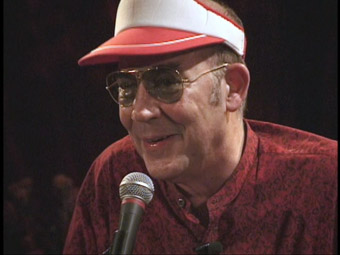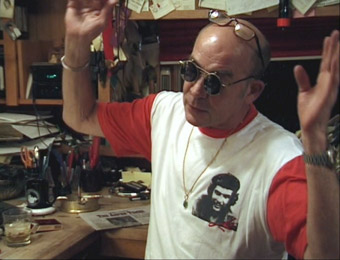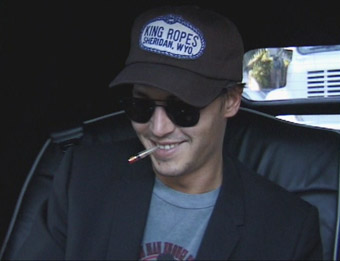|
I'm going to arrogantly kick off this review with the assumption that the majority of you will at the very least know who Hunter S. Thompson is. This is, after all, a site with a particular interest in artists who work outside of the mainstream and those whose work can, given the right set of socio-political conditions and that indeterminable element that is chance, become the subject of a cult following. Both are true of Dr. Thompson, but to say that his seminal self-portrait of journalistic misadventure and insane drug consumption that is Fear & Loathing in Las Vegas was and is a cult novel is an understatement akin to claiming that Romeo and Juliet has, on occasion, been performed on the stage. If you haven't read it and are not cursed by some conservative puritanical streak, then I can't recommend it highly enough. It's outrageous, wonderfully written, intermittently hilarious, and it takes you on a journey that few would be prepared to embark on in real life.
Thompson himself has remained a counter-culture icon. Credited as the creator of gonzo journalism (look it up if you don't know it – the term has made it's way into most reputable dictionaries), his early work attracted a passionate following, but after accusations of repetition in his writing and a poor response to the first film based on his work and life, Art Linson's 1980 Where the Buffalo Roam starring Bill Murray, he became something of a recluse, moving to a 'heavily fortified compound' in Wood Creek, Colorado known as Owl Farm. The release of Terry Gilliam's 1998 film version of Fear & Loathing in Las Vegas, starring Johnny Depp and Benicio del Toro, helped introduce his work to a new generation of enthusiastic readers, and the cult once again took hold. Thompson continued to write and put his journalistic weight behind issues he believed in, including the shaky conviction of Lisl Auman for the murder of a police officer, a successful campaign captured for posterity by documentary filmmaker Wayne Ewing in his 2006 film Free Lisl: Fear & Loathing in Denver. At a time when Thompson seemed to be carefully controlling just how much of himself he wanted revealed to the public gaze, he made a notable exception for Ewing and his camera. Originally planned several years earlier as a TV series to be shot on 16mm, Breakfast with Hunter focuses primarily on the period between September 1996, when Thompson was battling a trumped up Driving Under the Influence charge, and the New York premiere of the Fear & Loathing movie in May 1998.

From the opening scene you know you're in for a lively ride, as Hunter holds court at Hollywood's Viper Room, takes a question from an audience member whom he then has ejected, and is joined on stage by actors Johnny Depp and John Cusack, the latter providing a delicious reading of an hilariously indignant letter sent by Hunter to Deputy District Attorney Lawson Wills in response to the above mentioned DUI charge. A party organised to mark the twenty-fifth anniversary of the publication of Fear & Loathing in Las Vegas provides us with a glimpse of Hunter as both lucid interviewee and playful anarchist, his walk to Rolling Stone founder Jann Wenner's office enlivened by the discovery of a fire extinguisher, with which he blasts his dismayed publisher in the middle of a business call. Conservative journalist and some time comedy writer P.J. O'Rourke and McGovern campaign manager Frank Mankiewicz salute Hunter's talent, his son Juan pays a sincere and moving tribute to a fine father figure, while his good friend Ralph Steadman expresses concern for his health and effectively winds him up by suggesting that if it wasn't for his illustrations then Fear & Loathing would have gone unnoticed. There's even an extract from an old Thames TV article on Hunter's campaign to become sheriff of Aspen back in 1970, something I never expected to find in an American documentary feature, and an amusing reminder that British commercial television could sound as snootily superior as the stuffiest BBC report of the period.
In the tradition of the Direct Cinema works of the Maysles Bothers and D.A. Pennebaker, Ewing and his camera do not just observe Hunter going about his life and business, they become part of it, and thus by association so do we. There's an enthralling intimacy to Ewing's participation, with the players alternately ignoring and acknowledging the camera's presence as they might any third party in the room. Occasionally there is direct interaction between Ewing and his subjects, a component of American Direct Cinema films from Wolf Koenig and Roman Kroitor's Lonely Boy (1962) through to the Maysles' Grey Gardens (1975), and later the barrier between filmmaker and subject is temporarily stripped away when Hunter sits with Fear & Loathing producer Laila Nabulsi and actor Benicio del Toro to watch and comment on Ewing's footage from a previous scene in this very film.

Thompson himself is, of course, a dream subject for such a cinematic record. Unpredictable and volatile but also witty and intelligent, he's always entertaining, a genuine American eccentric who survived a descent into a chemical and alcoholic abyss and looks deceivingly well on it. He's rarely caught without a drink in his hand or at least close to it, the perpetual glass of iced whisky accompanying him to meetings, for walks down the street and even while driving. Inevitably this comes across as light-hearted, part of Thompson's enduring charm and fuck-you attitude to the expectations of so-called civilised society. But collectively this can't help but suggest a recklessness bordering on wilful self-destruction, not least in the eye-popping moment in which a bathrobe wearing Thompson is caught in a hotel room fixing himself a tall glass of whisky for breakfast. The retrospective knowledge of his 2005 suicide, which may or may not have been partly prompted by illness-induced physical pain, can't help but cast such moments in a darker light and make you aware that there was at least one aspect of his life that Thompson was not so willing to expose to the camera, masking it behind a wall of cheerful and unwavering energy. Hunter comes across as a performer who delights in the company and reaction of his carefully selected companions. In a telling moment he presents Nabulsi with a Polaroid of himself sitting alone on a bed to illustrate how he feels and why, prompting her to suggest that hell for Hunter would be the isolation the picture vividly suggests, to have no audience to play to.
But one of the most valuable aspects of Breakfast with Hunter, at least in film history terms, is its record of the helm control change on the film version of Fear & Loathing in Las Vegas. The ousting of original director Alex Cox and his co-scriptwriter Tod Davies has always been an issue that gets danced around rather than discussed in any detail – producer Laila Nabulsi's contribution to an audio supplement on Criterion's excellent 2-disc DVD release of Fear & Loathing provides a useful overview of what occurred, but is nonetheless still teasingly shy on the specifics. And yet here it all is, from Cox and Davies' first fateful visit to Owl Farm to the premiere of Gilliam's version, collectively the longest linear sequence in the film and one of its most fascinating. The meeting between Cox, Davies and Thompson in particular is both revealing and uncomfortable, with Thompson's increasing irritation and Cox and Davies' seeming intransigence blowing a disagreement up into what comes perilously close to an all-out fight – you have to hear to Ewing's DVD commentary to realise just how dangerous this situation almost became. A short while later this very footage is being assessed by Thompson, Nabulsi and del Toro, and Cox is dropped from the project. Tellingly, from the first moment we see del Toro he seems completely and comfortably in tune with Thompson in the very way that Cox and Davies were not. There's even a scene with Thompson on set of Gilliam's production for his cameo appearance* and some brief but priceless footage of Depp shadowing Thompson to develop his character.

This alone would make Breakfast with Hunter an invaluable film document and a must-have for Fear and Loathing fans looking to complete a background picture of the production. But the joy of the film is that this is just one component of a rich cornucopia of material that collectively paints a revealing, consistently absorbing and yet touchingly personal portrait of a unique and fascinating artist, a brilliant and fiercely individualistic talent who will very likely go down in history as one of the late twentieth century's greatest writers. I'll admit there are still a couple of Hunter Thompson related film pieces I've yet to see, but for now I'll happily champion Breakfast with Hunter, a winningly shot, edited and scored film that is as enlightening as it is entertaining, as THE Hunter S. Thompson movie.
Shot on video over a period that may well have entailed more than one camera and even video format and including archive material on everything from home video to 16mm film, the 4:3 transfer is nonetheless consistently pleasing, the more recent high-band video material displaying very good colour, contrast and detail, despite some inevitable whiting out of highlights. Even the old 16mm shot Thames TV report looks better than I'd have expected, given how grubby such archive footage often appears when incorporated into UK made TV documentaries. There is considerable digital grain and a drop in colour in darker interiors, but this is par for the vérité course and never an issue.
A single Dolby 2.0 stereo soundtrack is offered and is of high quality, especially given the inherent problems of recording sound under vérité conditions. Here it's consistently clear and despite the helpful inclusion of subtitles for Hunter's "low guttural mumblings" I had no problem at all following his dialogue. The source music, selected by Hunter himself, is reproduced with crystal clarity.
While other Wayne Ewing DVDs have been a little light on extra features, Breakfast with Hunter is very well specified in this area. Most are made up of footage not used in the feature, of which there must be a considerable amount given the time Ewing and his camera spent in Thompson's company, but there's also one other, excellent inclusion...
Commentary by Wayne Ewing and Hunter S. Thompson
There's an up-front announcement that Thompson had to be repeatedly cajoled to participate in this commentary and that he only stays for the first third of the film (and apparently even that took two weeks to record), but it's an enjoyable and sometimes enlightening 35 minutes, with Ewing effectively prompting Hunter for comments relating to the on-screen action. Surprisingly, perhaps (on second thoughts, perhaps not), it's once Ewing is on his own that the commentary really delivers the goods, mixing the anecdotal with back stories and technical details to consistently engaging and informative effect. This reaches a compelling peak in the sequence with Alex Cox and Tod Davies, where Ewing expertly deconstructs this fateful encounter, his
comments regarding Cox's invasion of Thompson's personal space tantalisingly suggestive of a darker, potentially violent side of Thompson's personality, one that in the wrong circumstances could unexpectedly and dangerously erupt. It's also through the commentary that we get to understand the level of commitment Ewing had to this project, which took a staggering eighteen years to complete and involved him working for Thompson in a number of other capacities, including road manager and assistant editor on several of his books.

Screwjack (9:46)
An entertaining sequence that cuts between writer P.J. O'Rourke and actor Don Johnson as they both read the infamous love letter to Screwjack from Thompson's 1991 story in Hunter's presence at Owl Farm.
Warren Zevon (4:14)
The composer and singer of Lawyers, Guns and Money and Werewolves of London visits the farm to work with Thompson on the song that eventually appeared on Zevon's 1992 album My Ride's Here as You're a Different Person When You're Scared.
Journalism Gonzo (12:43)
Part of an interview conducted by P.J. O'Rourke with Hunter at Owl Farm for Rolling Stone in 1996 and it says something about the relationship between the two men that this plays more like a social call, two friends sharing memories over a few drinks. It's consistently interesting and often revealing, as the two discuss and compare Nabokov's Lolita with Thomas Mann's Death in Venice and talk about the origins of the word Gonzo. Hunter reveals that its inclusion in modern dictionaries is one of his proudest achievements.
Oscar Acosta (5:54)
Hunter reminisces about Oscar Acosta, the man who was identified in Fear & Loathing in Las Vegas as Dr. Gonzo and who mysteriously disappeared in the mid 1970s. Included here is a tantalising snippet from the Viper Room session in which Thompson talks briefly about audio tape recordings made on the trip that inspired the book.
The Rum Diary (5:10)
A 1998 editing session on Hunter's (then) upcoming book The Rum Diary, originally written in the early 1960s and loosely based on his experiences as a journalist in Puerto Rico. Brief but still interesting, especially with the book now up for film adaptation with Johnny Depp in the lead and Bruce Robinson in the director's chair.
Fear & Loathing in America (6:04)
A late night editing session on Fear & Loathing in America in January 2000 with Hunter, Simon & Shuster editor Marysue Rucci and journalist and friend Curtis Robinson. Hunter is so on the ball here.
HT Bibliography
Detailed bibliography of Dr. Thompson's work.
I came late to this film but with admittedly sympathetic eyes. I have for a long time been a fan of Thompson's writing, and having discovered the work of Wayne Ewing through his groundbreaking cinematography on Homicide: Life on the Street, have only recently been catching up on his films as a director, all of which I've so far enjoyed. But here the two talents seem genuinely made for one another, Thomson's larger-than-life personality the perfect subject for Ewing's watchful yet unobtrusive camera, which gets us closer to the real Hunter S. Thompson than any documentary or interview you'll have seen before or are likely to see again. It's one of those films I feel no inclination to be objective about and enjoyed every keenly observed minute of. Hunter S. Thompson devotees should consider it an essential purchase, and no fan of the Fear & Loathing movie should be without it. If you know Thompson's work then Breakfast with Hunter will make you wish you'd had the opportunity to meet him, and if you don't then I can almost guarantee that by the film's end you'll want to read his work, and hopefully see more of Ewing's.
The DVD is first rate, featuring a fine transfer and a small treasure trove of additional material, including a very informative commentary track. As with other Wayne Ewing DVDs, you won't find this one in the shops and will need to order it direct from Ewing's web site at www.hunterthompsonfilms.com. You won't be disappointed. Highly recommended.
|